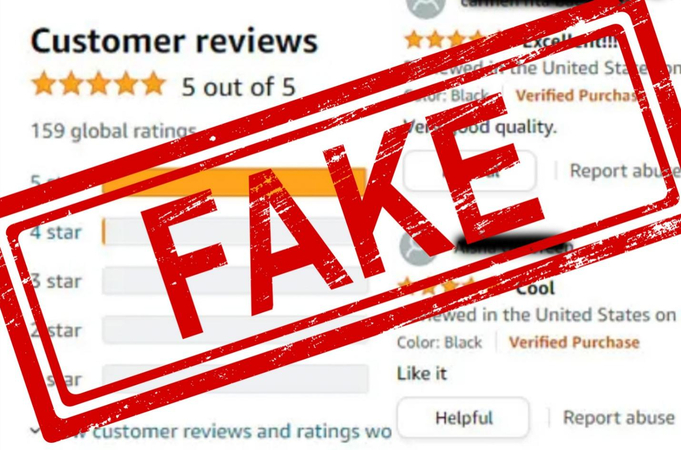AI-Generated Fake Reviews Are Misleading Consumers: Real Cases, Legal Risks, and Brand Fallout
Artificial intelligence (AI) features in almost every application, from creating emails to customer support robots. Although it has many advantages, however, it also generates new problems. One of the most deplorable issues is the fake review of AI-generated content. False reviews mislead customers, damage sincere sellers and cause critical problems with consumer trust. It also destroys the reputation management process of companies that rely on true reviews. This article is explaining how to identify fake reviews created by AI, how to mislead customers using examples such as Amazon Fake Review lawsuits, illegalty enforcing laws, and consumer protection tips for all not to use fake reviews.
Part 1: What Are AI-Generated Fake Reviews
AI-generated fake reviews are imitated reviews and ratings made by actors using tools and AI resources to make them appear as real feedback. They will be posted on shopping sites, restaurant websites and service sites. It is made for the purpose of unfairly affecting the buyer to overprice a particular product or to hurt a competitor. Fake reviews typically are composed in a natural, emotional voice. AI can churn out hundreds of something in an instant, and each is ever-so-slightly different to resemble a real thing. There are characteristic features though:
- Overuse of praise without specific details.
- Numerous reviews published at one time
- Duplication of words and awkward sentences
These false reviews harm truthful operators who rely on genuine reviews and cause serious problems with customer trust. For companies, anti-fake review actions are a major part of brand security and reputation management.

Part 2: How AI-Generated Fake Reviews Mislead Consumers - With Amazon's 2023 Case Study
Artificial reviews generated by AI not only bias opinion but also shape online purchasing behavior and the trust-building process itself. This section discusses how these reviews mislead customers with examples and facts from Amazon fake review court cases. Reveal the immense impact of AI deception on purchasing behavior and consumer trust in general.
Inside Amazon's Lawsuit Against 11,000 AI Review Accounts
Amazon in 2023 reported taking legal action against a massive ring of human-bots that provided false reviews. The fake review suit comprised thousands of accounts making paid positive comments on behalf of vendors. These fake accounts, Amazon stated, utilized AI and automation technology to make reviews on various products, which deceived consumers and undermined the integrity of the platform. Amazon says that its initiative has stopped more than 250 million fake reviews in 2023 alone. Further, there were legal actions against more than 150 fake review middlemen worldwide. Some of the middlemen cooked up fake transactions and penned "purchase verified" reviews.
Techniques used by AI review farms include:
- Generate loads of real comments with assistance from AI tools.
- Phony purchases are created and receive a "verified" label.
- How to compensate users and copy and post reviews on multiple accounts
Amazon's response:
Amazon employs AI systems and review investigators to identify abnormal patterns of activity. Check accounts that repeatedly frequent sites or repeat sentence patterns. The firm also sues and collaborates with regulators to shut down sites selling fake reviews. This example illustrates the scale and severity of the problem of AI-generated fake reviews, which is why stringent measures are required for consumer protection and reputation management.
Psychological Tactics Behind AI-Generated Fake Reviews
The AI system reads millions of authentic reviews and learns the language that convinces buyers. Tap that know-how to create true and emotional reviews.
Common tactics include:
- Emotional tone: Apply positive, genuine phrases like "wonderful," "life changes," and "the greatest ever."
- Personal touch: Feign to share the actual story and issues the product has alleviated.
- Overconfidence: There are no criticisms given in reviews that make you "too good and unbelievable."
Deceptive AI-made reviews succeed because customers trust other customers' views. The purchaser decides that the product is safe if it contains hundreds of five-star reviews. But if the majority of those reviews are not genuine, the purchaser has to have a misleading decision to make.
These fake reviews make consumers spend money on substandard products and undermine the trust in online markets. In the long run, the buyer becomes suspicious of all reviews, and authentic sellers are affected as well. Therefore, the ability to spotting fake reviews is a precious one for online shopping today.

How AI-Generated Fake Reviews Damage Brands and Consumer Trust
Fake reviews not only deceive consumers but damage brands as well.
Short-term gain vs long-term harm:
Fake reviews can be used by some sellers to increase sales. But whenever it gets caught, reliability is lost. Customers get cheated and company names get linked to fraudulence.
Public backlash:
When people become conscious of fraudulent review use, they post poor feedback on social media. It spreads like wildfire, resulting in repeated concerns with consumer trust. Even small fraudulent reviews break years of reputation work.
Platform penalties:
EC sites such as Amazon, Google, Yelp, etc. have now deleted samples or suspended accounts selling fake reviews. Some small operators have been permanently banned or lost accounts due to AI-generated fake reviews. The best defense against this is having real reviews and open customer comments.
Part 3: Legal Analysis: Why AI-Generated Fake Reviews Are Illegal in the EU and US
AI-generated spurious reviews not only deceive customers, but also violate consumer protection laws and advertising rules. The European Union as well as the United States regard spurious and AI review as misleading commercial practices and may cause significant financial losses and damage to reputations.

EU Regulations: AI-Generated Fake Reviews Violate the Unfair Commercial Practices Directive
The European Union considers false reviews as unfair commercial practices. The Unfair Commercial Practices Directive prohibits outright the production and marketing of reviews by fake consumers.
Key points include:
- Fake reviews must not be depicted as the actual opinion of customers.
- Counter-measures must be taken by the platform if it identifies false or artificial intelligence-made reviews.
- Fines up to 4% of the worldwide annual turnover can be levied in case of a violation.
By posting fake reviews for AI generation, vendors deceive consumers and distort genuine competition. These acts are prohibited and harm consumer confidence. Companies must ensure that everything they post is real and transparent to maintain credible reviews and reputation in good standing.
US Law: FTC Rules and the Honest Reviews Act Enforcement in AI-Generated Fake Reviews
In the United States, the Federal Trade Commission (FTC) treats fake reviews as fake advertisements. FTC Guidelines specify that all reviews should be a real and actual experience.
Under US law:
- It is fraud to post and purchase fake reviews.
- Companies that are aware that fake reviews generated by AI are being used can have hefty fines levied upon them or prohibited from selling entirely.
- Sites such as Amazon, Google and Facebook also have the responsibility to monitor and delete fake content.
These recent FTC steps are aimed both at sellers and review intermediaries. In another instance, a beauty firm which uploaded testimonials of AI writing under the name of a consumer was penalized. The FTC also warns influencers and advertisers against misleadings with AI tools.
These principles protect consumers and fair market competition. By complying, companies can maintain original reviews, protect brand reputations, and support good reputation management.
Part 4: How Consumers, Platforms, and Enterprises Can Respond to AI-Generated Fake Reviews
AI-created fake reviews affect every consumer, marketplaces, and businesses. All stakeholders can act and protect online trust.

How Consumers Can Detect and Avoid AI-Written Fake Reviews
Online consumers can take advantage of the following consumer protection while shopping online:
1. Watch for red flags:
- Too close or too perfect review
- Hyperventilating praise without itemizing product details
- New reviews posted in a wide array within hours to days
2. Use review-checking tools:
Online sites and browser extensions such as Fakespot, ReviewMeta, and AI Content Detection tools can help you locate and verify artificial reviews.
3. Compare sources:
Check the review on different websites before purchasing. You must be cautious if confirmation purchase feedback is absent despite having 5-star feedback on every website. These steps allow consumers to make good choices and avoid fraud. These safety measures are most important for consumer faith in the online marketplace to be guaranteed.
What Platforms Must Do to Combat AI-Generated Fake Reviews
Amazon, Google and eBay are just a few among these sites that are heavily involved in countermeasures against fake reviews. Good AI moderation tools and fair policies must be invested in.
Effective steps include:
- Utilization of AI programs for detecting review patterns, copied content, and repetitive words
- Identification requirements for sellers and reviewers
- Eliminate Fake Review Intermediaries and Suspend Review Operations Involved Accounts
- Publish an annual transparency report describing the amount of deleted fake reviews.
The website should incorporate an automatic system with a human verification team. This dual strategy will filter AI-generated fake reviews while authentic reviews are shown. These measures protect customer trust as well as honest seller reputation management.
Best Practices for Enterprises to Avoid Legal and Reputational Risks of AI-Generated Fake Reviews
Companies need to understand that human or AI-written fake reviews damage their reputation. Prevention is the key.
Key practices:
- Encourage real customer feedback: Ask the verified purchaser to leave a free review after purchase.
- Avoid paid or fake review services: Regardless of AI technology, these services are unlawful and against platform policy.
- Be transparent: Show an honest face to handle both positive and negative reviews.
- Monitor online reputation: Leverage review tracking software to instantaneously identify spurious reviews.
- Train staff: Educate marketing teams of the dangers of spurious reviews and the law regulating consumer protection.
Companies selling genuine reviews earn long-term trust and loyalty. Strong reputation management based on integrity allows brands to stay competitive even in the most competitive economies.
Conclusion
Spurious reviews of AI creation pose a genuine threat to all buyers, sellers and online marketplaces. These mislead consumers, damage brands and violate EU and US consumer protection laws. Amazon's fake review lawsuits demonstrate how widespread the issue is and why the lack of enforcement needed is greater than it used to be. AI still has a useful role to play - for example HitPaw VikPea helps users enhance videos responsibly, that is to say, AI can help with creativity without harm. Going forward, building trust through transparency and putting genuine feedback at the center by facilitating ethical AI is the key to building a safer and more reliable digital marketplace on the basis of good reputation management.
Leave a Comment
Create your review for HitPaw articles









